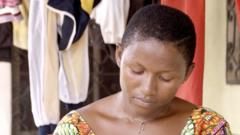The death of a much-loved star is normally followed by an outpouring of grief, but in South Africa, last week's loss of 75-year-old actress Nandi Nyembe also came with an outpouring of anger.
People were distressed that in the last months of her life, an obviously sick woman was reduced to appearing on videos appealing for financial help.
Sitting in a wheelchair, with thin, grey hair, wearing a loose T-shirt and fleece pyjama trousers, she said she did not like people feeling pity for her, but she needed money to cover the basics. Her biggest plea was for more work so she could support herself.
This was a far cry from her more famous screen appearances. As the lead in some major television series over recent decades, her face was beamed into the homes of South Africans and she became a familiar weekly presence.
Respectfully known as mam'Nandi, her passing, for some, felt like losing a close relative. A tribute jointly released by her family and the government hailed her as the very soul of South African storytelling.
Given that status, the way she appeared late in life was all the more shocking. Her death, after a long illness, has reignited the debate about the lack of support available to South African artists who are unable to work and has shone a spotlight on the struggle many face behind the scenes.
After an initial appearance fee, actors in South Africa do not receive any royalties for subsequent broadcasts of their work. They are employed as freelancers, and as a result, they get none of the possible benefits - such as a pension and health coverage - which may be available to regular employees. This means that every single actor who is active in this country right now is on an inevitable path to where mam'Nandi was, Jack Devnarain, South African Guild of Actors (Saga) chairperson, told the BBC.
An actor himself, Devnarain fondly remembered Nyembe's glory years, saying how welcoming and warm she had been towards him as a young artist. Nyembe was born in 1950 in Kliptown, the oldest part of Soweto - the black township just outside Johannesburg. Her acting career began in the 1970s at the height of the apartheid era.
Despite typecasting as a maid, Nyembe eventually made her mark in both theater and television. Among her notable roles was the recurring character of an HIV-positive nurse in the groundbreaking drama Soul City, airing during a period when HIV/AIDS was a significant national issue.
Nyembe's legacy reminds us of the vital contributions artists make and the importance of ensuring their well-being during and after their careers. Her death is a call to action for South Africa to address the systemic inequalities that affect its creative talent.





















